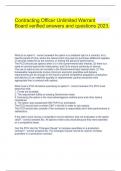Contracting Officer Unlimited Warrant Board verified answers and questions 2023. What is an option? - correct answers.An option is a unilateral right in a contract, for a specific period of time, where the Government may elect to purchase additional supplies or services called for by the contract, or extend the period of performance. The PCO should use options when (1) in the Governments best interest, (2) there is a need for service beyond the initial period, and (3) to ensure continuity of service. The use of options are not normally in the Governments best interest when (1) The fores eeable requirements involve minimum economic quantities and delivery requirements are far enough in the future to permit competitive acquisition, production, and delivery (2) an indefinite quantity or requirements contract would be more appropriate than a contract with options. What must a PCO do before exercising an option? - correct answers.The PCO must determine that: 1. Funds are available 2. The requirement fulfills an existing Government need 3. Exercising the option is the most advantageous method p rice and other factors considered 4. The option was synopsized IAW FAR 5 (or exempted) The PCO should have a written D&F in the file in order to use options The PCO should also consider if the contractor is responsible and if their performance is satisfact ory. If the option price during a competitive source selection was not evaluated, is the option valid? - correct answers.No. All options need to be priced because they were awarded on a competitive basis. Can the PCO cite the "Changes Clause" to increase quantities on a production contract? - correct answers.No. The Changes Clause cannot be used to increase quantities on a production contract. (a) The Contracting Officer may at any time, by written order, and without notice to the sureties, if any, make changes within the general scope of this contract in any one or more of the following: (1) Drawings, designs, or specifications when the supplies to be furnished are to be specially manufactured for the Government in accordance with the drawings, designs, or specifications. (2) Method of shipment or packing. (3) Place of delivery. Is any approval required for an effort that is out of scope ? - correct answers.Changes outside the scope of the original contract are considered new work and constitute a cardin al change, and in this case, one of two things should happen: 1. Compete the new work 2. Get a J&A and seek proper approval What are the four essential elements the PCO must address when making a Scope Determination? - correct answers.1. Scope of the comp etition - could the original offerors have reasonable anticipated such a change? 2. Contract type - Requirments should be better defined in a FFP contract therefore require less changes. As opposed to a RDT&E contract. 3. Period of performance - will the PoP be extended significantly so as to constitute new work? 4. Overall cost/price change - what has been the total change in price throughout all modifications? What must the PCO do for any change and/or modification es timated to be $1M or more? - correct answers.Obtain legal review of the proposed action and document the review in the contract file Where can a PCO look to help determine if a change is in -scope? - correct answers.Various source documents to include: SOO /SOW/PWS, synopsis, RFP, exchanges with industry, market surveys, RFIs, etc. What is "scope creep?" - correct answers.Scope creep occurs when a series of in -
scope changes make the contract as a whole out -of-scope. The PCO must remain cognizant of scope cr eep when changing/modifying existing contracts. What is a T&M contract? - correct answers.Limitations. A time -and-materials contract may be used only if — (1) The contracting officer prepares a determination and findings that no other contract type is suit able. The determination and finding shall be — (i) Signed by the contracting officer prior to the execution of the base period or any option periods of the contracts; and (ii) Approved by the head of the contracting activity prior to the execution of the ba se period when the base period plus any option periods exceeds three years; and (2) The contract includes a ceiling price that the contractor exceeds at its own risk. The contracting officer shall document the contract file to justify the reasons for and a mount of any subsequent change in the ceiling price. Also see 12.207(b) for further limitations on use of Time -and-Materials or Labor Hour contracts for acquisition of commercial items. Can a T&M contract be used for a commercial service? - correct answer s.a) Except as provided in paragraph (b) of this section, agencies shall use firm -fixed -price contracts or fixed -price contracts with economic price adjustment for the acquisition of commercial items. (b) (1) A time -and-materials contract or labor -hour con tract (see Subpart 16.6) may be used for the acquisition of commercial services when — (i) The service is acquired under a contract awarded using — Competitive Procedures, Fair Opportunity, with an executed D&F Define Certified Cost or Pricing Data. - corre ct answers.All facts, that as of the date of price agreement, or if applicable, an earlier date agreed upon between the parties that's as close as practicable to the date of agreement on price, prudent buyers and sellers would reasonably expect to affect p rice negotiations significantly. When is Certified Cost and Pricing data required? - correct answers.When executing actions over $750,000 with the exception of prices established by statute, commercial items, with adequate price competition, and when a TI NA waiver is granted. What is the "Bona Fide Needs" Rule? - correct answers.The Bona Fide Needs Rule basically means that a federal agency must have a legitimate or bona fide need for the requirement during the time period that the appropriation is availa ble. Pursuant to 31 U.S.C. 1502(a), "The balance of an appropriation limited for obligation to a definite period is available only for payment of expenses incurred during the period of availability, or to complete contracts properly made during the period of availability and obligated consistent with Section 1501 of this title.." In other words, the basic rule states that a fiscal year's (FY) appropriation may be obligated to meet a legitimate or bona fide need existing in the FY for which the appropriation was made. This aspect of fund availability seeks to ensure that only appropriations, which are available for a specific FY are used to meet the legitimate needs of that FY. The bona fide needs rule applies to both multiple year and annual appropriations. TIME, PURPOSE, AMOUNT You have just awarded 3 contract actions. You remember something in FAR Part 5 about synopsizing contract awards. The first action was a Small Business Innovation Research contract for $99,978. The second action was a $3M new deliver y order under an existing IDIQ contract and the third action was a purchase order for $12,995. As a PCO, would you synopsize these contract actions? - correct answers.SBIRs, delivery orders under existing IDIQ contracts and actions under the simplified acq uisition threshold ($150K) do not require an award synopsis. However the dollar threshold is not a prohibition against publicizing an award of a smaller amount when publicizing would be advantageous to industry or to the Government. What is the requirement for obligating funds when awarding indefinite -quantity contracts? - correct answers.For ID/IQ contracts all supplies and services to be furnished shall be obtained via delivery order(s) or task order(s) issued by individuals designa ted in the contract. Upon execution of the contract, an obligation shall be recorded based upon the issuance of a delivery or task order for the cost/price of the minimum quantity specified. Obtaining a certification of availability of funding from the finance office does not satisfy the requirement to record an obligation in the official accounting records of the Government for the minimum order amount established by the award of an IDIQ contract. The Government's actual obligation must be recorded at the time of contract award. Recording and subsequently reporting the required obligation using anything other than a delivery or task order will result in the action not being reported in FPDS -NG. The Recording of Obligations Act is implemented in the DoD Fina ncial Management Regulation (FMR) (DoD 7000.14 -R) (See paragraph 080504 of the FMR). The Defense Finance and Accounting Service (DFAS) is responsible for recording contractual obligations in the Air Force accounting records. Where the quantity required und er a contract is indefinite, the ultimate amount of obligation is determined by subsequent orders; the amount of any required minimum order specified in the contract, however, shall be recorded as an obligation upon execution of the contract. For contracts that require the contractor to perform unilaterally placed orders above the required minimum, record an obligation in the amount of the order price or ceiling at the time the order is placed. An order in excess of the required minimum that has to be negot iated or accepted by the contractor under terms of the contract shall be recorded as an obligation upon contractor's acceptance of the order in the amount of the agreed price or ceiling . In the case of orders for services where a contractor cannot underta ke performance without direction from an authorized Government official, order amounts may be consolidated periodically (at least monthly) into a list of orders placed with the contractor identifying the estimated dollar amount of each. On definite -quantit y contracts, obligate the full amount of the definite quantity at the time of contract award. When may a T&M contract be used? What must the D&F contain? Who would approve the following D&Fs: A T&M contract for $650K; A T&M contract for $500K in which the base period plus option periods will be a total of 4 years; A T&M contract for $1.5M of services (base plus options will be 5 years.)? - correct answers.T&M contract may be used only when it's not possible at the time of placing the contract to estimate accurately the extent or duration of the work or to anticipate costs with any reasonable degree of confidence, and ONLY if the PCO prepares a D&F that "no other contract type is suitable," and the contract includes a ceiling price that the contractor exceed s at their own risk. The D&F must contain sufficient facts and rationale to justify that no other contract type is suitable (should go through all the contract types). At a minimum the D&F shall include a description of the market research conducted and es tablish that it is not possible at the time of placing the contract or order to accurately estimate the extent or duration of the work or to anticipate costs with any reasonable degree of certainty. A T&M contract for less than $1 million would have the PC O as the approval for the D&F. A T&M contract for $500K in which the base plus options is 4 years would be approved





